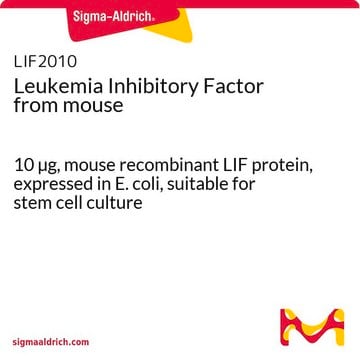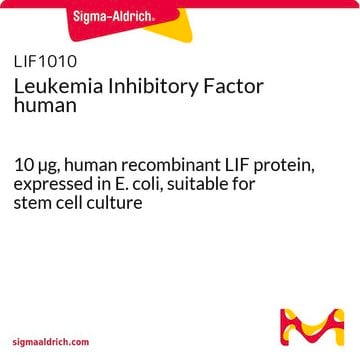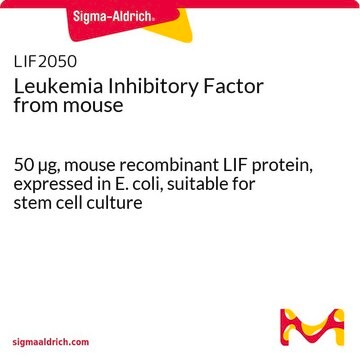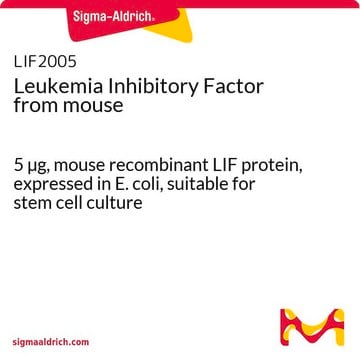L5158
Leukemia Inhibitory Factor from mouse
≥95% (SDS-PAGE), recombinant, expressed in E. coli, buffered aqueous solution, suitable for cell culture
Sinónimos:
LIF
About This Item
Productos recomendados
product name
Leukemia Inhibitory Factor from mouse, LIF, recombinant, expressed in E. coli, 10 μg/ml, buffered aqueous solution, suitable for cell culture
recombinant
expressed in E. coli
Quality Level
assay
≥95% (SDS-PAGE)
form
buffered aqueous solution
quality
endotoxin tested
technique(s)
cell culture | mammalian: suitable
storage temp.
2-8°C
¿Está buscando productos similares? Visita Guía de comparación de productos
Application
- as a component of enriched co-culture media
- as a supplement in Dulbecco′s modified eagle′s medium (DMEM)/F12 medium for culturing heart cells
- as a component in maintenance medium for maintaining embryonic stem cells
- to treat ovaries in ovarian culture
Biochem/physiol Actions
Physical form
Analysis Note
Legal Information
Storage Class
11 - Combustible Solids
wgk_germany
WGK 3
flash_point_f
Not applicable
flash_point_c
Not applicable
ppe
Eyeshields, Gloves, type N95 (US)
Certificados de análisis (COA)
Busque Certificados de análisis (COA) introduciendo el número de lote del producto. Los números de lote se encuentran en la etiqueta del producto después de las palabras «Lot» o «Batch»
¿Ya tiene este producto?
Encuentre la documentación para los productos que ha comprado recientemente en la Biblioteca de documentos.
Los clientes también vieron
Artículos
Leukemia Inhibitory Factor (LIF) is a stem cell growth factor used for the in vitro culture of pluripotent mouse embryonic stem cells (ES cells).
Nuestro equipo de científicos tiene experiencia en todas las áreas de investigación: Ciencias de la vida, Ciencia de los materiales, Síntesis química, Cromatografía, Analítica y muchas otras.
Póngase en contacto con el Servicio técnico













